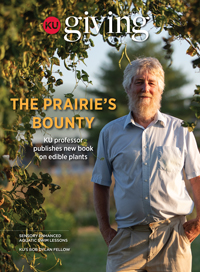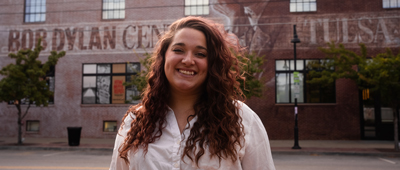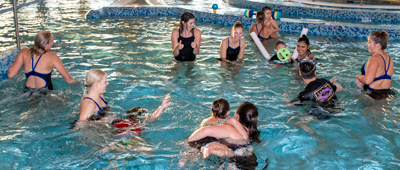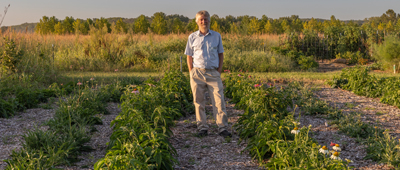Support for Finals and the Community
Emily Becker
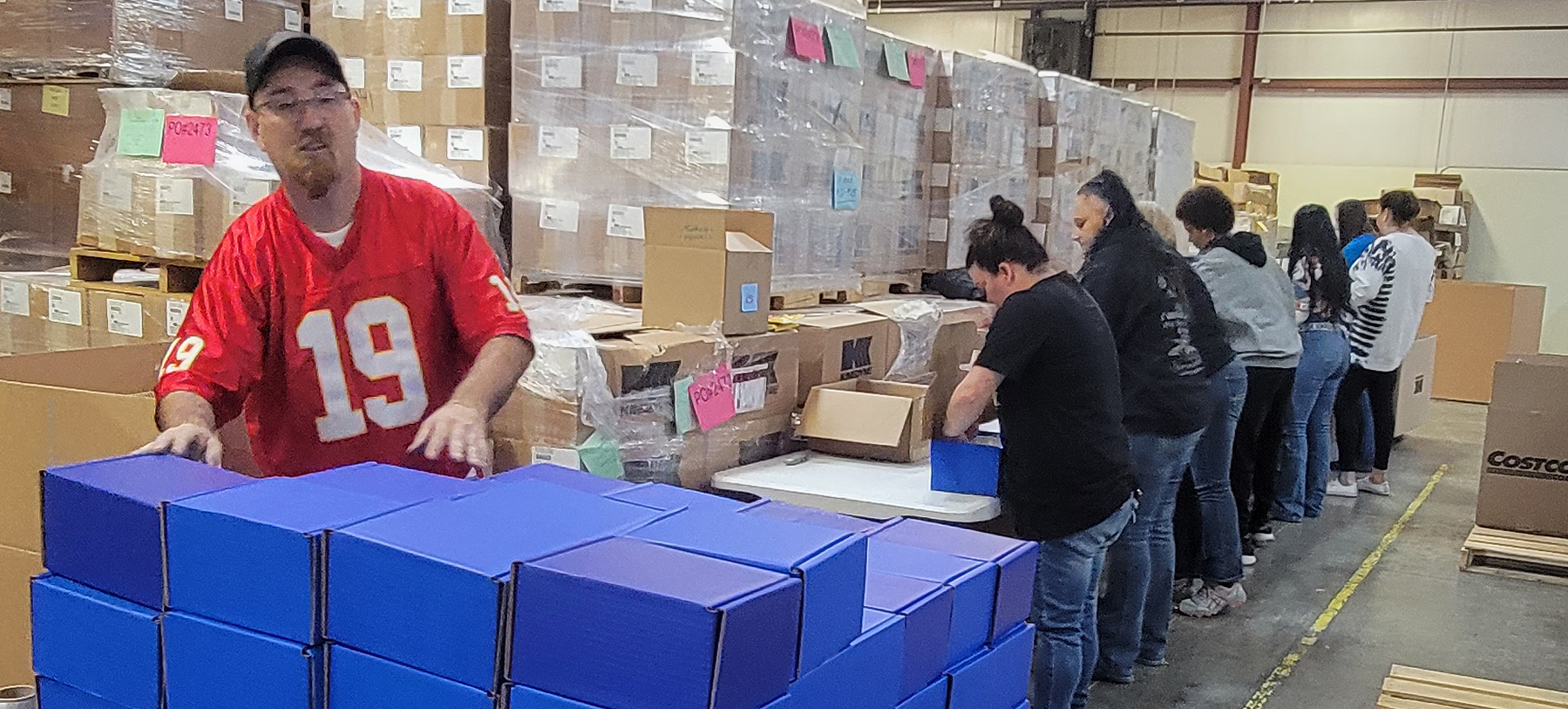
PACKAGING CARE: Work services coordinator Steve Steinbach (left) and Cottonwood Industries team members assemble KU Finals Survival Kits for the fall 2022 semester.
KU Finals Survival Kits benefit programs on and off campus
For KU students, finals week each semester can be a stressful time, filled with late-night studying and early morning coffee runs. For donors, the week is a chance to support not only students but the greater Jayhawk community through KU Endowment’s KU Finals Survival Kits program.
The initiative launched in fall 2019 with the simple idea to engage KU parents through the opportunity to send their students a package of snacks and KU swag items during finals week. That semester, the team hoped to sell 200 kits, and they were thrilled when the number of kits ordered totaled more than 500.
Since then, the program has grown by more than 300%, raised more than $60,000 to support initiatives countering food insecurity on campus and helped establish a partnership between KU Endowment and Cottonwood Incorporated, a Lawrence nonprofit organization that provides services to individuals with intellectual or developmental disabilities.
“The Finals Kits are a little thing we can do that can have a big impact with students in multiple ways,” said Ricardo Zamora, senior multichannel campaign coordinator at KU Endowment. “During finals week, students tend to feel lots of overwhelming emotions — stress, fear, anxiety — and that can really get in the way of studying, how exams go and their overall academic success. And when you throw hunger into the mix, students may have an even harder time focusing.”
Before a KU Finals Survival Kit arrives in a student’s hands, it is assembled at Cottonwood as part of its Cottonwood Industries program, which employs about 140 individuals who are experienced in manufacturing and production jobs that need to be completed by hand. There, the associates package each kit in a bright blue or crimson box, adding items such as packs of granola bars, cookies and crackers as well as nonperishable KU-branded items that change each semester. In the past, the kits have included a beanie, stress ball, sunglasses and phone screen sanitizer.
Cottonwood has been partnering with KU Endowment on the project since the beginning, and according to Robert Bieberle, business development manager at Cottonwood, it is one of the staff’s favorites. “We never have to ask, ‘who wants to work on this project?’” he said. “We’ve got a ton of Jayhawks out there.”
He said that while Cottonwood associates may not have experienced the stress of a university finals week themselves, putting together a package that will help raise the spirits of a KU student makes them happy.
The partnership also gives KU Endowment the chance to support the larger Lawrence community and raise awareness of Cottonwood’s work.
“For our staff, it is important to see the impact of our work,” Zamora said. “We’ve taken tours of Cottonwood, and our employees have been able to see how the impact goes beyond the university.”
After assembly, the kits are distributed on campus the week before finals. But a finals kit’s benefit does not end once it is delivered. When ordering, donors have the option to send a kit to a specific student or students, donate one to a student in need or both. The donated kits as well as all proceeds from the program are given to initiatives that work to end food insecurity among KU students, such as the Campus Cupboard on the Lawrence campus.
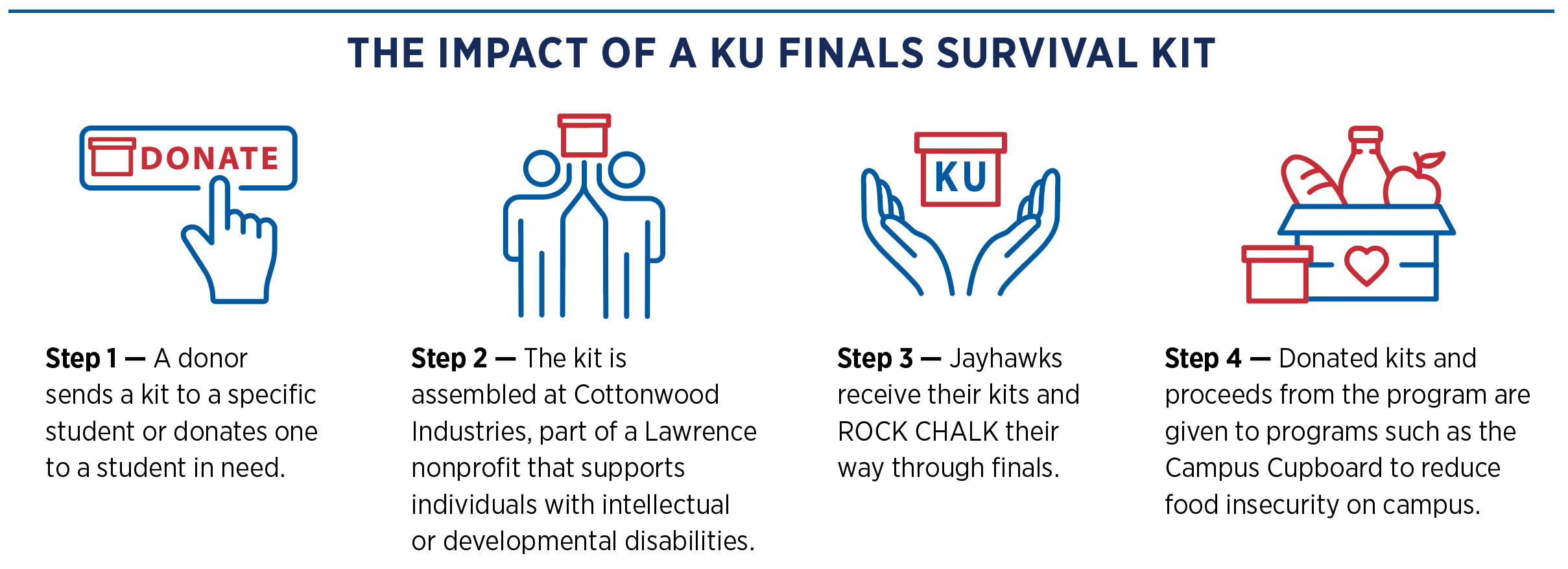
Nearly one in three KU students struggles with food insecurity, according to a 2018 survey. Sarah Ross, case manager in the KU Student Support office, said the Campus Cupboard is currently busier than ever, including a 166% increase in number of visits this February compared to February 2022.
“We really believe food insecurity is not just addressing food. It is a basic needs insecurity because of how much it impacts those who are facing it,” Ross said. “Food insecurity impacts academics and physical health, but also emotional health. We have to ask, if a student is unable to access food, what else aren’t they able to access or afford?”
The monetary donation from the Finals Kits program helps Campus Cupboard staff the location, restock the shelves with nonperishable food items and fund Food for Jayhawks, the dining plan that is part of the network of emergency aid available for students. The donated kits themselves are made available to students through the Campus Cupboard, who also appreciate the extras in the kits that aren’t just snacks.
“We always get such great feedback from people in our space, and the kits are really helpful,” Ross said. “It is a nice pick-me-up during finals.”
As for future finals weeks, Zamora hopes to expand the Finals Survival Kits program to assist more students and programs at KU while also deepening outside partnerships.
“KU Endowment is more than just raising money,” he said. “It is building relationships and building a better community in any way that you can give your time, talent and support. This is a great example of that.”
